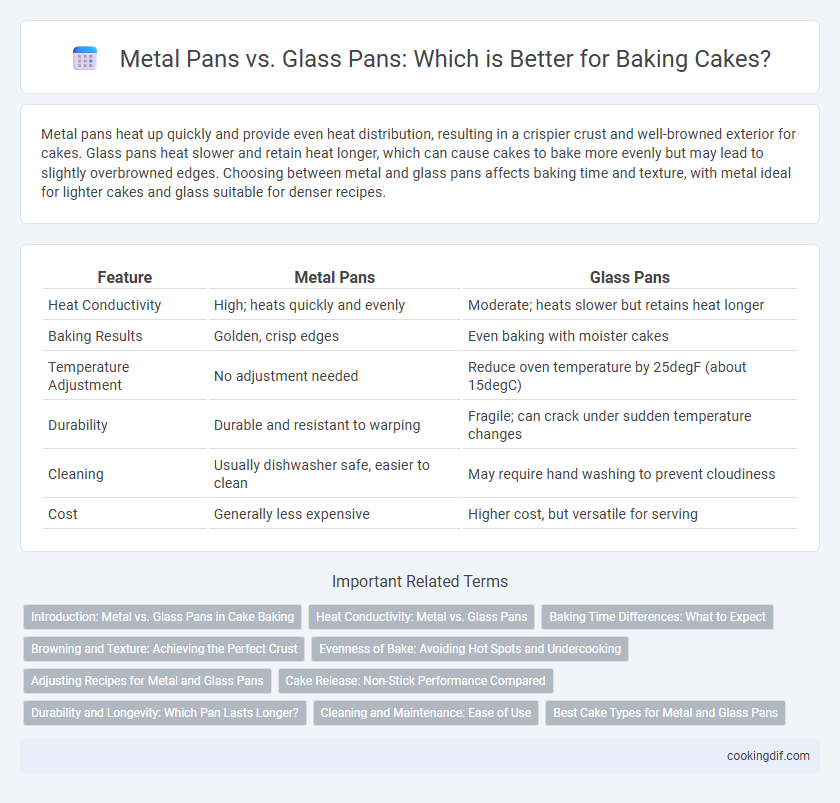Metal pans heat up quickly and provide even heat distribution, resulting in a crispier crust and well-browned exterior for cakes. Glass pans heat slower and retain heat longer, which can cause cakes to bake more evenly but may lead to slightly overbrowned edges. Choosing between metal and glass pans affects baking time and texture, with metal ideal for lighter cakes and glass suitable for denser recipes.
Table of Comparison
| Feature | Metal Pans | Glass Pans |
|---|---|---|
| Heat Conductivity | High; heats quickly and evenly | Moderate; heats slower but retains heat longer |
| Baking Results | Golden, crisp edges | Even baking with moister cakes |
| Temperature Adjustment | No adjustment needed | Reduce oven temperature by 25degF (about 15degC) |
| Durability | Durable and resistant to warping | Fragile; can crack under sudden temperature changes |
| Cleaning | Usually dishwasher safe, easier to clean | May require hand washing to prevent cloudiness |
| Cost | Generally less expensive | Higher cost, but versatile for serving |
Introduction: Metal vs. Glass Pans in Cake Baking
Metal pans conduct heat faster and provide even browning, making them ideal for cakes requiring a crisp crust and precise baking times. Glass pans heat more slowly and retain heat longer, promoting a moist texture but often resulting in darker edges. Choosing between metal and glass depends on the cake type and desired texture, with metal favored for delicate crumb and glass preferred for dense, heavy cakes.
Heat Conductivity: Metal vs. Glass Pans
Metal pans offer superior heat conductivity compared to glass pans, ensuring even baking and crispier crusts due to faster heat transfer. Glass pans heat more slowly and retain heat longer, which can lead to overbaking edges while the center remains undercooked. Bakers often prefer metal pans for their precise temperature control and consistent baking results.
Baking Time Differences: What to Expect
Metal pans conduct heat more efficiently than glass pans, resulting in shorter baking times and a more evenly browned crust. Glass pans retain heat longer, causing cakes to bake slower and potentially require a temperature reduction of 25degF to prevent over-browning. Expect cakes in glass pans to take approximately 5 to 10 minutes longer to bake compared to those in metal pans.
Browning and Texture: Achieving the Perfect Crust
Metal pans conduct heat efficiently, promoting faster browning and creating a crisp, golden crust ideal for cakes that require a well-defined texture. Glass pans heat more evenly but retain heat longer, which can result in slower browning and a softer, moister crust that enhances tender cake textures. Choosing between metal and glass pans depends on the desired crust firmness and crumb structure, with metal offering a more pronounced crust and glass providing a gentler bake.
Evenness of Bake: Avoiding Hot Spots and Undercooking
Metal pans conduct heat more efficiently than glass pans, resulting in faster and more even baking that minimizes hot spots and reduces the risk of undercooked centers. Glass pans heat up more slowly and retain heat longer, which can cause uneven baking and overcooked edges while the middle remains underbaked. For recipes requiring precise temperature control and uniform texture, metal pans provide superior consistency in cake bake evenness.
Adjusting Recipes for Metal and Glass Pans
Metal pans heat cake batter more quickly, leading to faster browning and potentially drier edges, so baking time should be slightly reduced by 5 to 10 minutes compared to glass pans. Glass pans distribute heat more evenly and retain heat longer, requiring an increase in oven temperature by 25degF (about 15degC) and a longer baking time to ensure thorough cooking. Adjusting recipes by lowering oven temperature for metal pans and increasing for glass pans helps achieve consistent texture and doneness in cake baking.
Cake Release: Non-Stick Performance Compared
Metal pans typically offer superior cake release due to their efficient heat conduction and non-stick coatings, ensuring cakes easily slide out without damage. Glass pans, while slower to heat, retain heat longer, which can cause sticking if not properly greased or floured beforehand. Choosing metal pans with quality non-stick surfaces enhances cake release and overall baking performance.
Durability and Longevity: Which Pan Lasts Longer?
Metal pans, crafted from materials like aluminum or stainless steel, offer superior durability due to their resistance to cracking and chipping, ensuring extended usability in baking. Glass pans, while excellent for even heat distribution, are more prone to breakage and can degrade over time with repeated exposure to temperature fluctuations. Consequently, metal pans typically outlast glass pans, making them a more long-lasting investment for frequent cake baking.
Cleaning and Maintenance: Ease of Use
Metal pans offer superior durability and ease of cleaning, as their non-porous surface prevents cake residue from sticking and allows for quick washing by hand or dishwasher. In contrast, glass pans may require more careful maintenance to avoid scratching and can retain baked-on grease, necessitating soaking or scrubbing for thorough cleaning. Choosing metal pans simplifies ongoing care and maintains consistent baking performance over time.
Best Cake Types for Metal and Glass Pans
Metal pans excel in baking cakes that require a crisp crust and even browning, such as chocolate cakes, angel food cakes, and cheesecakes because they conduct heat efficiently. Glass pans are ideal for casseroles and lighter cakes like sponge cakes and fruit cakes, as they distribute heat more slowly and maintain moisture without over-browning. For recipes demanding delicate textures and consistent heating, selecting the appropriate pan material enhances the final cake quality.
Metal pans vs Glass pans for cake baking Infographic

 cookingdif.com
cookingdif.com